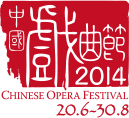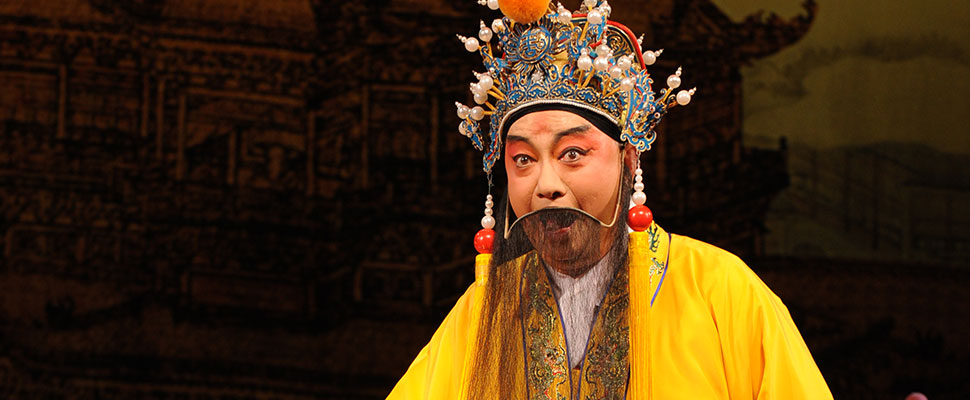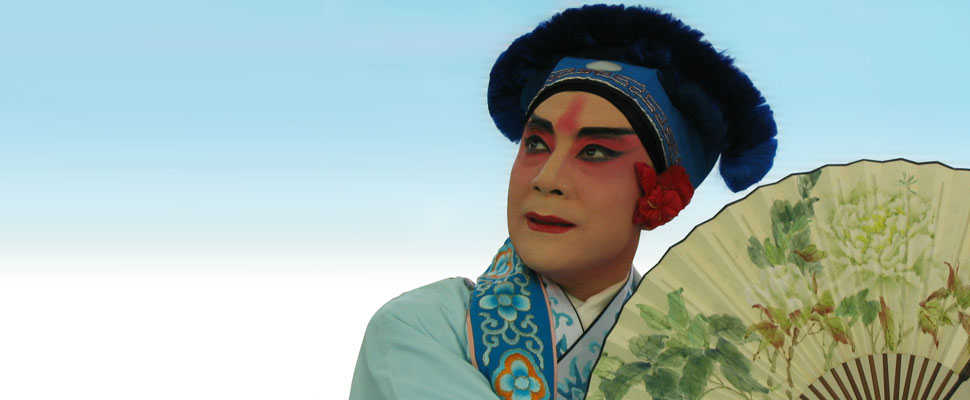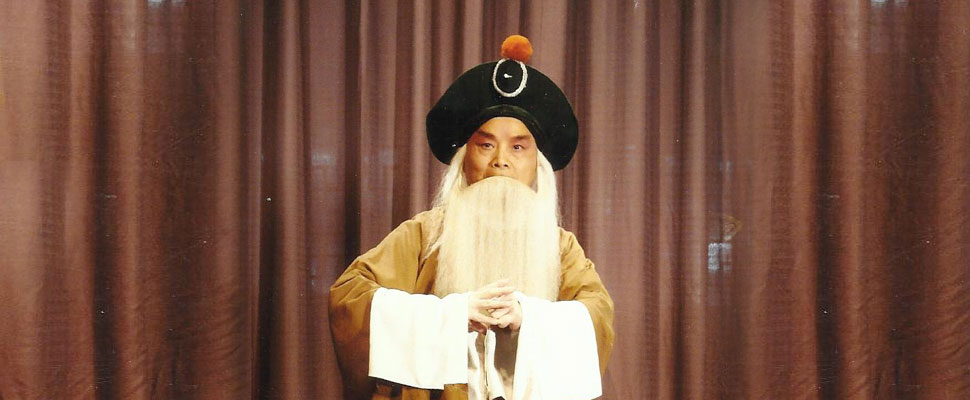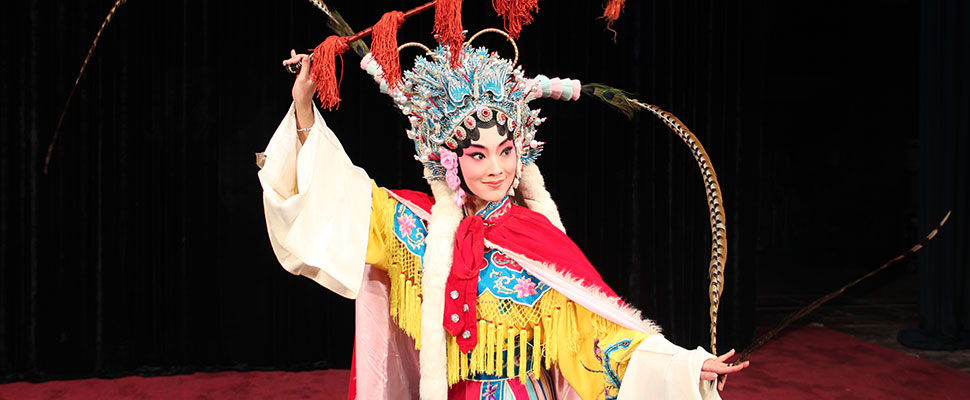When Wu Song was passing by Jingyang Ridge, he encountered a fierce tiger. Though heavily drunk, he killed the tiger with his bare hands and became famous. In Yanggu County, Wu Song ran into his elder brother Wu Dalang, and he went to stay with him. Wu Da’s wife Pan Jinlian married Dalang out of circumstances. When she saw the gallant and good-looking Wu Song, she immediately fell for him. At home Jinlian prepared some wine and tried to reveal her heart to Wu Song, but was sternly rejected by him. Wu Da came home from his daily cake-peddling, and learnt that Wu Song had to leave to do his business. They said goodbye to each other in tears. One day, when Jinlian was lowering down the bamboo curtain outside her window, the stick she used slipped off her hand and hit the head of Ximen Qing who happened to pass by there. Ximen Qing was stunned by Jinlian’s beauty; they exchanged jokes and flirted with each other. Madam Wang, the tea house owner, received money from Ximen Qing and arranged them to meet under the pretext of making clothes. Their illicit affairs continued until one day they were caught by Wu Da on the spot. Ximen Qing kicked and injured Wu Da. Madam Wang then persuaded Jinlian to poison her husband. When Wu Song returned home and found out that his brother had died, he questioned Jinlian who lied to him that Wu Da died of a sudden illness. That night, when Wu Song was keeping vigil for his brother; the spirit of Wu Da appeared before him. The next day, Wu Song talked to the neighbours who testified against Jinlian. Wu Song questioned Jinlian in front of his brother’s altar. Jinlian admitted to adultery and poisoning Wu Da. Wu Song killed her and Ximen Qing before surrendering himself to the county court.

- Peking Opera Research Centre of Hebei
- Four Stylistic Schools of Xiaosheng Roles in Yue Opera
- A New Cantonese Opera Investigation to Redress a Wrong
- Reverberating Notes from South China Highlights of the Eight Classic Pieces
- Zhejiang Yongjia Kunqu Opera Troupe
- Yunnan Dian Opera Theatre
- Experimental Theatre of Liyuan Opera of Fujian
- Haifeng Baizi Opera Troupe of Guangdong
- No.2 Troupe of Yu Opera Theatre of Henan
- Jingkun Theatre
Jingkun Theatre
The upcoming programme presented by Jingkun Theatre promises to be a sumptuous feast, with a galactic cast of Kunqu virtuosi from Beijing, Hong Kong and Shanghai gathering on the Hong Kong stage. There will be Hou Shaokui, Cai Zhengren, Tang Yuen-ha, Lu Yongchang and Geng Tianyuan. Together with the cast of Northern Kunqu Opera Theatre, they will be performing many classics in the Kunqu repertory. The full-length opera, Wu Song and Pan Jinlian, has a main cast featuring Hou Shaokui as the upright Wu Song, Tang Yuen-ha as the enticing Pan Jinlian, and Geng himself as the debonair Ximen Qing. Seeking Shelter for His Son is a bravura piece for actors in laosheng roles. Starring Lu Yongchang, it will be a high-voltage, compelling drama of Wu Zixu’s painful parting with his own son. In Disaster Strikes and The Death of Lady Yang, two excerpts from The Palace of Eternal Life, a story about the love between Emperor Ming and his favourite concubine, Lady Yang, the audience can expect to see the charismatic personae interpreted by Tang Yuen-ha and Cai Zhengren.
Wu Song and Pan Jinlian
| cast | Hou Shaokui, Tang Yuen-ha, Geng Tianyuan, Fan Hui, Wang Feng (Wu Song of Wu Song Killing the Tiger and A Hero’s Welcome) |
Lady Zhaojun Departs the Frontier
The Emperor of the Han dynasty, Yuandi, sent the court painter Mao Yanshou to select beautiful girls in the country. Those selected would be taken to the imperial palace, and their portraits presented to the emperor who would then pick the ones he liked. Wang Zhaojun, a girl of unrivalled beauty, was reluctant to offer bribes to Mao Yanshou. As a result Mao Yanshou made her look ugly in her portrait and she was banished to the cold palace. One day coincidentally Yuandi met Zhaojun and was astonished by her beauty. He immediately made her an imperial concubine and granted her the title of Mingfei. Fearing punishment, Mao Yanshou fled to Xiongnu and presented the real portrait of Zhaojun to the Xiongnu King. Stunned by Zhaojun’s beauty, he immediately asked Yuandi for the hand of Zhaojun. Fearing that his army is not strong enough to resist the Xiongnu troops, Yuandi was forced to give up Zhaojun to the Xiongnu King. On the day when Zhaojun and her entourage came to Yanmen Guang, the border pass, she stopped and sighed three times at each step, and bowed to her hometown from afar.
| cast | Wang Liyuan |
Seeking Shelter for His Son from The Beauty Washing Silk by the River
During the Warring States period, the King of Wu (Fu Cha) wanted to attack the distant Kingdom of Qi. His Prime Minister Wu Yuan (Wu Zixu) strongly advised against it. However, Wu Yuan knew that this would antagonize the King who would punish him by executing everyone in his family and his clan. As he was about to visit Qi, he made use of the opportunity and took his son with him to see his good friend Bao Mu hoping that Bao would raise his son for him. On their way, Wu Yuan told everything to his son who did not fully believe in what he said. When they arrived at Bao’s house, Wu Yuan told Bao the reason of his visit and ordered his son to take Bao as his father. Knowing that they will not see each other again, Wu Yuan and his son wept bitterly. Overcome by grief, Wu Yuan’s son fainted. Finally, Wu Yuan left in sorrow.
| cast | Lu Yongchang |
Disaster Strikes and The Death of Lady Yang from The Palace of Eternal Life
Disaster Strikes
Deeply in love with each other, the Emperor of the Tang dynasty, Minghuang and Lady Yang Guifei drank and enjoyed the autumn scene in the imperial garden. Lady Yang sang the Song of Purity and Peace, a poem newly written by the great poet Li Bai, while she danced. This greatly pleased Minghuang who made Lady Yang drink until she was drunk. While they were sharing the happy moments, Yang Guozhong, the brother of Lady Yang, came and reported that An Lushan rebelled and was approaching the capital Chang’an after he had shattered Tong Guan. Alarmed and frightened, Minghuang made an edict ordering the lords to come to his rescue. Meanwhile he and Lady Yang made their way to Sichuan to take refuge there.
The Death of Lady Yang
When the imperial guards escorted Minghuang and Lady Yang to Mawei Station, all of them were hungry and thirsty. Accusing Yang Guozhong for dominating the imperial court with his power which caused the rebellion, the guards killed him. They also urged Minghuang to give up Lady Yang and grant her death so as to calm the country. Minghuang refused and the army responded with an uproar. To ease their anger, Minghuang painfully granted Lady Yang a white silk ribbon. Full of grief, she hung herself with it.
| cast | Cai Zhengren, Tang Yuen-ha, Lu Yongchang |
Hou Shaokui
A renowned Kunqu artist specializing in wusheng (military male) roles, Hou Shaokui began his training at the Northern Kunqu Opera Theatre in 1956. Under the guidance of his father, Kunqu and Peking Opera virtuoso Hou Yongkui, he has mastered the artistic styles of his father, and is considered as the upholder of the artistic legacy of the Hou stylistic school. He is good at portraying characters of soldierly and heroic bearing. His signature repertoire includes Lin Chong’s Nocturnal Escape, To the Banquet Armed, Hua Rong Dao, Wu Song and Pan Jinlian, Escorting Jingniang Thousands of Miles, Bidding Farewell to His Mother and Killed by a Shower of Arrows, Siping Mountain, Battle at Mount Telong and Subduing Gao Deng at Yanyang Tower. He was the recipient of the 2nd Plum Blossom Award for Chinese Theatre, the Government Special Allowance Award from the State Council of the People’s Republic of China, and is recognized as a national exponent of Kunqu. He is now the Vice-president of the Chinese Society for Theatre Performance, Honorary Director and Artistic Director of Henan Yu Opera Theatre of Kaifeng City, and a member of the China Theatre Association.
Cai Zhengren
A master in Kunqu, Cai Zhengren is one of the first graduates of the Shanghai Municipal Chinese Opera Institute. He specializes in xiaosheng (young civil male) roles and is particularly good at acting as guansheng (male officials) roles. He has studied under Kunqu masters Yu Zhenfei, Shen Chuanzhi and Zhou Chuanying. His representative repertoire includes Sounding the Bell and Disposing the Royal Family, Disaster Strikes and The Death of Lady Yang, Welcoming the Statue and Lamenting the Statue, Li Bai Writing in an Inebriated State, Witnessing the Slaughter, Seeing His Mother, Pretending to be Jealous, and Footsteps on the Snow. He has also appeared as a leading role in full-length operas such as The Palace of Eternal Life, The Story of the Lute, The Story of the Horse Trader, The Peony Pavilion, The Legend of the White Snake, Misunderstandings Caused by a Kite, A Chain of Schemes, Ban Zhao, and The Peach Blossom Fan. Cai Zhengren has received numerous awards including the 4th Plum Blossom Award for Chinese Theatre, the Leading Performer Award at the Bai Yulan Performing Arts Awards for Shanghai Theatre, the Honor Award for Performance at the 1st China Kunqu Opera Arts Festival, the 1st Baogang Beaux Arts Award, the Special Honorary Award at the 4th China Kunqu Opera Arts Festival, the 13th Wenhua Performance Award (top of the honour roll), and the Special Award for Outstanding Literature and Art Talents presented by the Shanghai Literature and Art Talents Foundation. He is now an executive board member of the China Kunqu Research Institute, Director of the China Theatre Association, the Vice-chairman of the Shanghai Theatre Association, and an adjunct professor of the Arts Faculty of the University of Shanghai.
Tang Yuen-ha
A renowned Peking Opera and Kunqu artist in Hong Kong, Tang Yuen-ha has studied under Yu Zhenfei, a legendary figure of Kunqu and Peking Opera, received martial art training from famous wudan (military female) Zhang Meijuan, and mastered the artistic styles of Cao Hewen, Yao Chuanxiang and Chen Zhengwei. Her performance is fresh, lively and refined, and she is known for her ability to portray female roles of different types and with different characters. Her signature works include mixed Kunqu and Peking Opera performance of The Legend of the White Snake; Kunqu Opera The Peony Pavilion, The Story of the Jade Hairpin, Wu Song and Pan Jinlian, Double Meeting, Disaster Strikes and The Death of Lady Yang, and The Marriage Proposal; and Peking Opera The Great Heroine, The House Wulong, Jin Yunu, You Sanjie, The Lotus Lantern, and Muke Fortress. In 1991, Tang won the 8th Plum Blossom Award for Chinese Theatre; and in 2001, she received an Outstanding Performance Award at the 3rd China Peking Opera Festival. She was also the winner of the Award for Best Artist 2008 (Xiqu) presented by the Hong Kong Arts Development Council. In 2010, Tang was conferred the Medal of Honour by the HKSAR Government. She is the founder and Artistic Director of the Jingkun Theatre, Director of the China Theatre Association, and a member of the Hong Kong Arts Development Council.
Geng Tianyuan
A National Class One Performer and a member of the China Theatre Association, Geng Tianyuan is currently the director, actor and instructor of the Jingkun Theatre. He graduated from the Academy of Chinese Traditional Theatre in 1971, specializing in sheng (male) roles. In his career in Chinese theatre, Geng has been an artist playing the leading role, a theatre company director and a director. He is versatile in playing a varied repertoire of different roles, and can depict the personality and feelings of the characters in a meticulous way. His artistic endeavours cover Peking Opera, Kunqu Opera, Xiang Opera, Cantonese Opera, drama, dance and film. In recent years, he has revived, adapted and directed an admirable range of productions including Kunqu Opera Pursuing the Dream and The Portrait from The Peony Pavilion, and Wu Song and Pan Jinlian; Peking Opera The House Wulong, Jin Yunu and The Great Heroine; Xiang Opera The Rabbit; and Cantonese Opera The Wooden Hairpin. In 1995, Geng won a Class One Award for Directing in Shandong; in 1996, he received the Best Director Award at the 6th Wenhua Awards presented by the Ministry of Culture; and in 2007, he won the Best Actor Award at the 3rd Festival of Traditional Chinese Opera in Paris. In 2012, he graduated with distinction of Master of Arts in Chinese Culture at the Hong Kong Polytechnic University.
Lu Yongchang
A Kunqu artist and educator, Lu Yongchang was one of the first students graduating from the Kunqu Performers Class of the Shanghai Chinese Opera School. Specializing in laosheng (old male) roles, he received training from two artists of the ‘Chuan’ generation, Zheng Chuanjian and Ni Chuanyue. He has a rich repertoire; his performance is bold, vigorous and free, giving insightful portrayal of the characters he plays. His representative works include Seeking Shelter for His Son from The Beauty Washing Silk by the River, Looking Homeward from The Story of Sheep Pasturing, Searching the Mountain and The Rescue of Ming Emperor Jianwen from Slaughtering Thousands of the Loyal, Beating His Son from The Story of Courtesan Li, A Feast from A Chain of Schemes, Weeping in the Prison Cell and The Reunion from The Story of the Horse Trader. Apart from performing, he has been a teacher of Kunqu for many years; his students include backbone actors Yuan Guoliang and Xiang Weidong. He is currently teaching at the Zhejiang Chinese Opera School.
Wang Liyuan
Wang Liyuan is an outstanding young artist in the Northern Kunqu Opera Theatre. She graduated from the Kunqu Opera Class of Beijing Xiqu Art Vocational College, specializing in guimendan (high-born, unmarried female) roles. She has studied under renowned artists Zhang Yuwen, Qin Shaoyu, Zhang Xunpeng, Shen Shihua, Kong Zhao, Gu Fengli and Zhou Xuewen. Her repertoire includes Wandering in the Garden, Yearning for the World, The Broken Bridge, Lady Zhaojun Departs the Frontier, A Dream that Never Ends, Water Combats from The Jingshan Temple, Romance of The West Chamber, and Wang Zhaojun.
Jingkun Theatre
Established in 1986, Jingkun Theatre is a company dedicated to the development and promotion of Peking Opera and Kunqu Opera. Over the years, it has produced and organized various kinds of performances, talks, workshops and courses. Recent major productions include The Exquisite Charm of Peking Opera and Kunqu Opera, Three Stars in Peking Opera, Plum Blossom Award Winning Showcase and Yu Zhenfei and His Artistic Lineage in the Chinese Opera Festivals. Earlier productions include the Peking Opera Concert which showcased the various vocal styles and traced the development of Peking Opera in the last hundred years, The Great Belfry which was a Chinese Opera adaptation of The Hunchback of Notre Dame by Victor Hugo, and The Return of the Condor Heroes which was based on the novel of the same title by Louis Cha. In 2001, Jingkun Theatre was invited to represent Hong Kong in the China Peking Opera Festival held in Nanjing, and in 2006, to represent Hong Kong in the China Kunqu Opera Festival held in Suzhou. In 2007, it was invited to represent Hong Kong and the Peking Opera genre in the 3rd Festival of Traditional Chinese Opera in Paris, and won the Prix Special du Jury (Special Jury Prize) and the Best Actor Award for its performance of The House Wulong. Apart from performances and creative production, Jingkun Theatre has also conducted arts education and guided appreciation sessions for primary, secondary and university students in Hong Kong. One of its programmes, How Much Do You Know about Peking Opera and Kunqu Opera, conducted with lively explanations, full-cast performance and live orchestral accompaniment, has become the Theatre’s most popular guided appreciation programme. Over the years, Jingkun Theatre has been invited to give seminars, workshops and demonstrational performances at the University of London, University of York, Centre for Performance Research of the University of Wales, Australian National University, University of Sydney and Queensland Conservatorium.
Jointly performed by Northern Kunqu Opera Theatre
Established in 1957, Northern Kunqu Opera Theatre follows a two-pronged path in its artistic pursuit: honouring the traditional repertory of works, while striving to expand it through reviving and adapting the old, and creating the new on the other. The Theatre has accumulated a rich acclaim-winning repertory over the years, such as The Peony Pavilion, The Story of the West Chamber and The Story of the Jade Hairpin. In the last decade or so, the Theatre has staged many original productions such as The Minister’s Son Who Became an Opera Artist, Guan Hanqing and Wang Zhaojun. The Theatre has garnered countless awards in Chinese traditional theatre competitions in Beijing and all over China, with artists Hong Xuefei, Hou Shaokui, Cai Yaoxian, Yang Fengyi, Liu Jing, Wang Zhenyi, Shi Hongmei and Wei Chunrong all winning recognition at the prestigious Plum Blossom Awards for Chinese Theatre. Its 1995 production The Story of the Lute was awarded the Wenhua Award for New Stage Productions. The Minister’s Son Who Became an Opera Artist also won the Wenhua Award for New Stage Productions in 2004 and was shortlisted for the Ten National Fine Stage Arts Projects in 2005, and won the 4th Beijing Literary Awards. In 2009, the Theatre’s new production, The Story of the West Chamber, was presented the Outstanding Repertory Award by the Ministry of Culture. The Theatre has made highly popular performing tours to countries and places.
STAGE

Ticket Price
![]() $320
$320
![]() $240
$240
![]() $180
$180
![]() $120
$120
- With Chinese and English surtitles
- Each performance lasts approx. 2 hours and 30 minutes with a 15-minute intermission
| Programme Enquiries | 2268 7325 |
| Ticketing Enquiries | 3761 6661 |
| Telephone Credit Card Booking | 2111 5999 |
| Internet Booking | www.urbtix.hk |
Please click here for discount scheme details.
